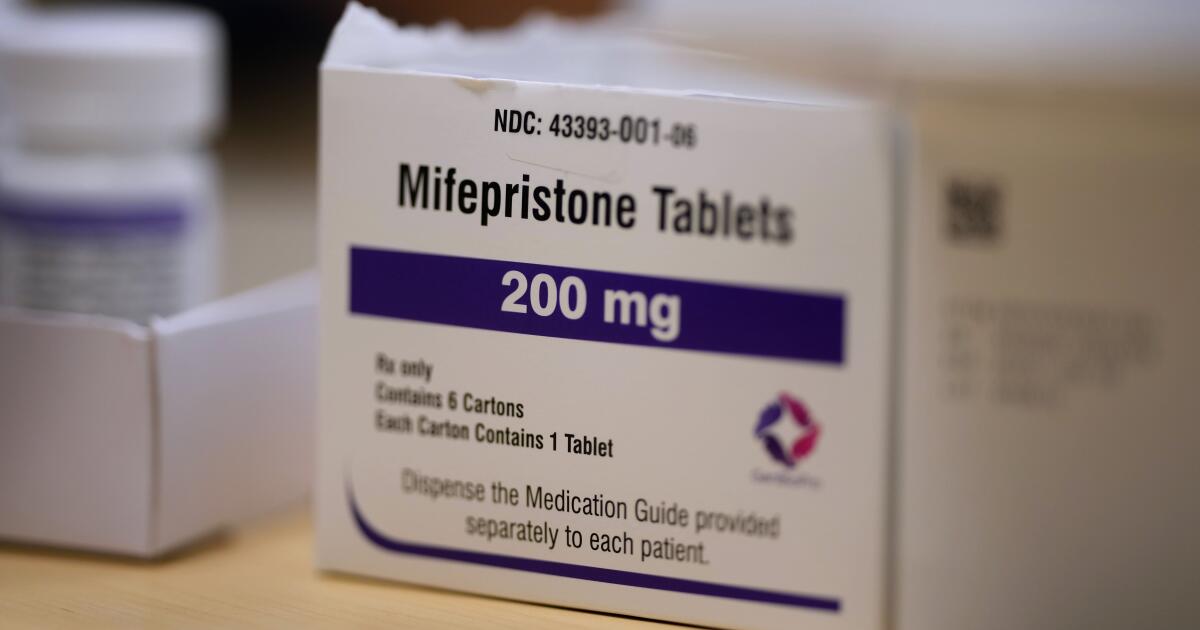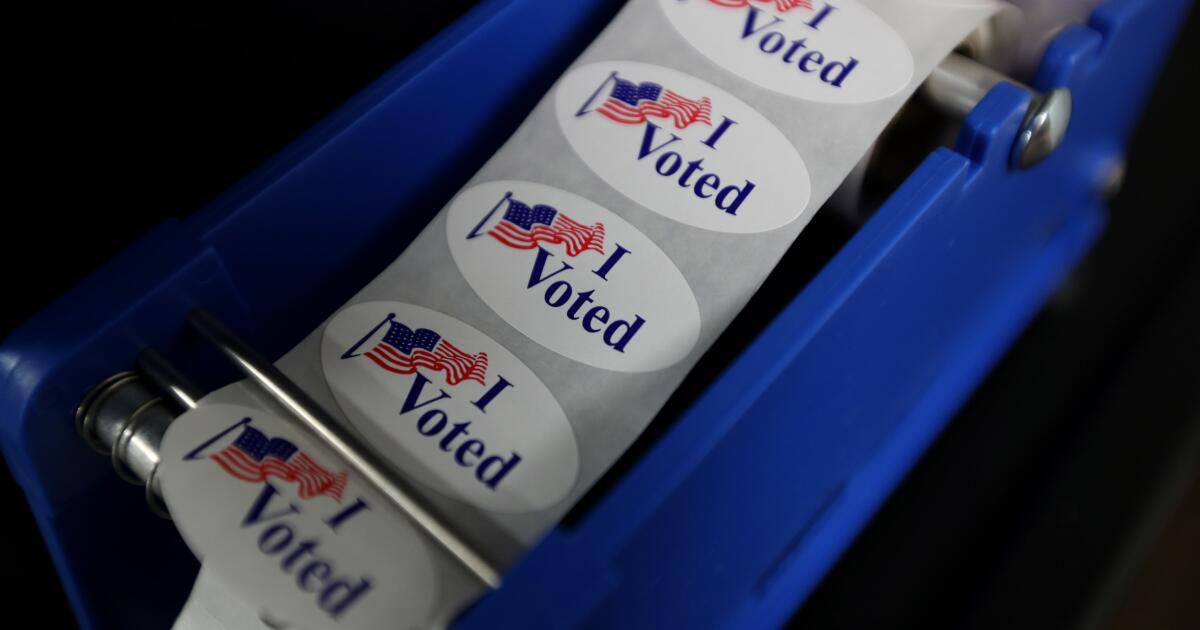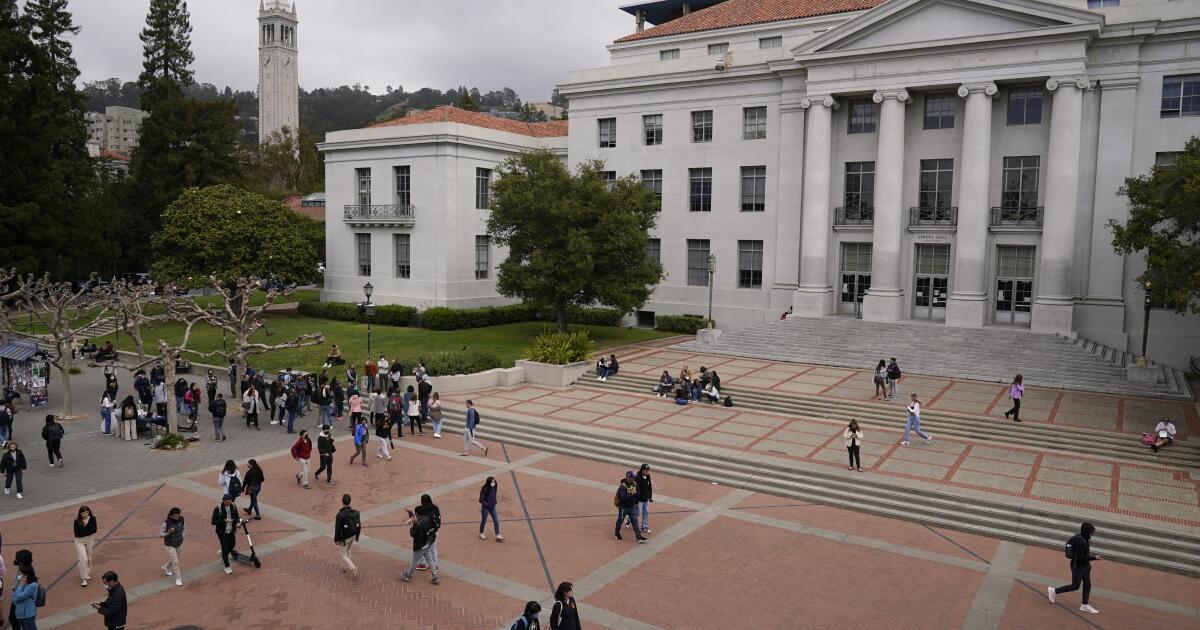California sues DOJ over demand that schools ban trans athletes
California sued the U.S. Justice Department on Monday over its demand last week that local school districts ban transgender youth from competing in sports, arguing the federal agency had overstepped its authority in violation of both state and federal law.
The “pre-enforcement” lawsuit was filed “in anticipation of imminent legal retaliation against California’s school systems” for not complying with the agency’s directive by its Monday deadline, said California Atty. Gen. Rob Bonta’s office, which is handling the litigation.
“The President and his Administration are demanding that California school districts break the law and violate the Constitution — or face legal retaliation. They’re demanding that our schools discriminate against the students in their care and deny their constitutionally protected rights,” Bonta said in a statement. “As we’ve proven time and again in court, just because the President disagrees with a law, that doesn’t make it any less of one.”
The lawsuit comes a week after Assistant Atty. Gen. Harmeet Dhillon, a Trump appointee and head of the federal Justice Department’s Civil Rights Division, sent a letter to school districts across California warning them that they faced potential “legal liability” if they did not “certify in writing” by Monday that they will break with California Interscholastic Federation rules and state law to ban transgender athletes from competition in their districts.
Dhillon argued that allowing transgender athletes to compete “would deprive girls of athletic opportunities and benefits based solely on their biological sex,” in violation of the U.S. Constitution.
State Supt. of Public Instruction Tony Thurmond responded last week by saying in his own letter to schools that Dhillon’s warning carried no legal weight and that school districts were still obligated to follow state law, which requires transgender athletes be allowed to compete on teams based on their gender identity.
The California Department of Education sent a letter to federal authorities Monday, informing them that California’s school districts are under no obligation to provide certifications to the Justice Department.
“There are no changes in law or circumstances that necessitate a new certification,” wrote General Counsel Len Garfinkel. “Moreover, the DOJ letter references no law that would authorize the DOJ to require another ‘certification.’”
“All students — not just transgender students — benefit from inclusive school environments that are free from discrimination and harassment,” Garfinkel added. “When transgender students are treated equally, their mental health outcomes mirror those of their cisgender peers.”
Bonta’s lawsuit asks a federal court in Northern California to uphold the constitutionality of California’s antidiscrimination laws protecting transgender athletes, and to bar the Trump administration from withholding funds or taking other retaliatory actions against school districts that refuse to abide by the Trump directive.
The lawsuit falls along one of the fastest growing legal and political fault lines in America: Does the equal protection clause of the 14th Amendment — the Constitution’s oft-cited guarantee against discrimination — protect transgender rights or undermine them?
Dhillon, other members of the Trump administration and anti-transgender activists nationwide have argued that the inclusion of transgender girls in youth sports amounts to illegal discrimination against cisgender girls.
Bonta’s office and other LGBTQ+ advocates argue that the exclusion of transgender girls is what constitutes illegal discrimination — and that courts, including the U.S. 9th Circuit Court of Appeals, which governs California and much of the American West, have agreed.
While Dhillon “purports that compliance with the Equal Protection Clause requires the categorical exclusion of transgender girls from girls’ sports, as courts have previously upheld, just the opposite is true: the Equal Protection Clause forbids such policies of total exclusion, as does California law,” Bonta’s office said.
State law that allows transgender students to participate in sports consistent with their identity “is squarely within the State’s authority to ensure all students are afforded the benefits of an inclusive school environment, including participation in school sports, and to prevent the serious harms that transgender students would suffer from a discriminatory, exclusionary policy.”
An attorney who supports keeping transgender athletes out of girls sports said the rights of female athletes are paramount in this situation.
Both the U.S. Constitution and federal statute provide protections for female athletes that California is violating by “allowing males into ‘girls only’ categories,” said Julie A. Hamill, principal attorney with California Justice Center, a law firm that has complaints pending with the federal Office for Civil Rights on behalf of young female athletes.
“By continuing to fan flames of division and play politics, leftist politicians and media outlets are causing further harm to American girls,” Hamill said.
Polls have shown that Americans generally support transgender rights, but also that a majority oppose transgender girls competing in youth sports. Many prominent advocates for excluding transgender girls from sports praised Dhillon’s actions last week as a bold move to protect cisgender girls from unfair competition.
Sonja Shaw, a Trump supporter who is president of the Chino Valley Unified Board of Education, has called on California school systems to adopt resolutions in support of the Trump administration order.
“The stakes couldn’t be higher,” Shaw said last week. “Our daughters deserve safe, fair competition … But radical policies are undermining that right, pushing boys into girls’ sports and threatening their opportunities. We’re not backing down.”
Shaw, a candidate for state superintendent of public instruction, said other school systems could model these resolutions on one passed by her school district.
A handful of the state’s 1,000 school districts have passed such resolutions.
The lawsuit’s claim that retaliation from the Trump administration could be imminent for schools that do not comply with the administration’s demands is not entirely speculative. It is based at least in part on repeated threats and actions the administration has already taken against states over its trans-inclusive sports policies.
President Trump has said outright that he wants to cut federal funding to California over its laws allowing transgender athletes to compete in youth sports. The federal Justice Department has announced investigations into the state and the California Interscholastic Federation over its inclusive policies for transgender athletes.
U.S. Atty. Bill Essayli in Los Angeles, a longtime ally of Dhillon and whose appointment has yet to be confirmed, recently threw his office’s support behind a private lawsuit challenging the inclusion of a transgender athlete on the track and field team at Martin Luther King High School in Riverside.
Dhillon issued her letter to California school districts after another transgender athlete from Jurupa Valley High School, 16-year-old AB Hernandez, won multiple medals at the state high school track and field championships despite President Trump demanding on social media that she not be allowed to compete.
The letter came despite attempts by the state to appease concerns.
After Trump’s online threats, for example, the CIF updated its rules for transgender competitors. As a result, Hernandez was allowed to compete at the state finals in the girls’ long jump, high jump and triple jump, but her qualifying did not result in the exclusion of any cisgender girl.
In addition, while Hernandez was awarded several medals, those medals were also awarded to cisgender girls who otherwise would have claimed them had Hernandez not been competing — with the girls sharing those spots on the medal podiums.
Supporters of the rule change said it eliminated concerns about cisgender girls losing opportunities to compete and win to transgender girls, but critics said the changes did not go far enough, and that transgender athletes needed to be fully banned from competition.
Dhillon’s letter demanding school districts certify that such bans were being implemented made no mention of the CIF’s rule change.




